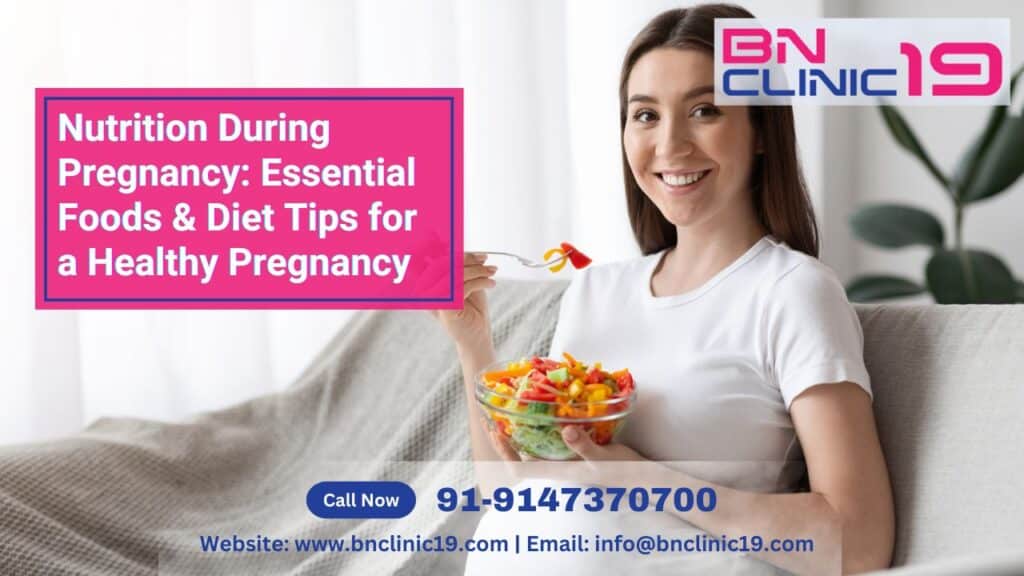Nutrition During Pregnancy: Essential Foods & Diet Tips for a Healthy Pregnancy
In this article, we’ll explore the best pregnancy foods, essential nutrients, and dietary tips that every expecting mother should follow. Why is Nutrition Important During Pregnancy? During pregnancy, a woman’s body undergoes significant changes that increase nutritional requirements. A well-balanced diet helps in: ✔️ Fetal Brain and Organ Development – Nutrients like folic acid, omega-3 fatty acids, and protein aid in cognitive and organ development. ✔️ Reducing Pregnancy Complications – A nutrient-rich diet helps prevent anaemia, gestational diabetes, and high blood pressure. ✔️ Supporting Maternal Health – Essential nutrients ensure strong immunity, healthy weight gain, and reduced fatigue. ✔️ Ensuring a Healthy Birth Weight – Proper nutrition reduces the risk of low birth weight and preterm labour. ✔️ Strengthening the Baby’s Bones and Immune System – Nutrients like calcium, vitamin D, and iron play a vital role in fetal bone growth and oxygen supply. Essential Nutrients & Best Foods for Pregnancy 1. Folic Acid (Vitamin B9) – Prevents Birth Defects ✔️ Why It’s Important: Folic acid helps prevent neural tube defects (spina bifida, anencephaly) in babies. ✔️ Best Sources: Leafy greens (spinach, kale), lentils, beans, citrus fruits, fortified cereals. ✔️ Daily Requirement: 600 mcg. 💡 Tip: Start taking folic acid supplements before conception and continue through pregnancy. 2. Iron – Supports Oxygen Transport ✔️ Why It’s Important: Iron helps in red blood cell production and prevents iron-deficiency anaemia. ✔️ Best Sources: Spinach, red meat, tofu, lentils, eggs, fortified cereals, nuts. ✔️ Daily Requirement: 27 mg. 💡 Tip: Consume iron-rich foods with Vitamin C (oranges, tomatoes) for better absorption. 3. Calcium – Essential for Bone and Teeth Development ✔️ Why It’s Important: Helps in baby’s bone formation and prevents osteoporosis in mothers. ✔️ Best Sources: Milk, cheese, yogurt, almonds, tofu, sesame seeds. ✔️ Daily Requirement: 1000 mg. 💡 Tip: Avoid excessive caffeine, as it interferes with calcium absorption. 4. Protein – Builds Baby’s Muscles and Organs ✔️ Why It’s Important: Protein is essential for fetal growth, cell repair, and maternal energy levels. ✔️ Best Sources: Eggs, dairy, poultry, fish, lentils, soy products, nuts. ✔️ Daily Requirement: 75-100g per day. 💡 Tip: Include lean protein in every meal to sustain energy levels throughout pregnancy. 5. Omega-3 Fatty Acids – Essential for Brain Development ✔️ Why It’s Important: Supports baby’s brain, eye, and nervous system development. ✔️ Best Sources: Salmon, walnuts, flaxseeds, chia seeds, fortified eggs. ✔️ Daily Requirement: 200-300 mg DHA. 💡 Tip: Avoid high-mercury fish like swordfish, mackerel, and tuna. 6. Vitamin D – Strengthens Immunity and Bones ✔️ Why It’s Important: Aids in calcium absorption, immune function, and fetal bone growth. ✔️ Best Sources: Sunlight, dairy, mushrooms, fatty fish (salmon, tuna). ✔️ Daily Requirement: 600 IU. 💡 Tip: Spend 15 minutes in the sun daily for natural vitamin D synthesis. 7. Fibber – Prevents Constipation & Aids Digestion ✔️ Why It’s Important: Helps prevent constipation and bloating, common during pregnancy. ✔️ Best Sources: Whole grains, vegetables, fruits, beans, lentils, nuts. ✔️ Daily Requirement: 25-30g per day. 💡 Tip: Drink plenty of water to help fibre work effectively. Foods to Avoid During Pregnancy 🚫 Raw or Undercooked Meat & Eggs – Risk of bacterial infections (Salmonella, Listeria). 🚫 Unpasteurized Dairy & Juices – May contain harmful bacteria. 🚫 High-Mercury Fish – Avoid shark, king mackerel, swordfish due to high mercury levels. 🚫 Excess Caffeine & Alcohol – Can hinder fetal growth and cause birth defects. 🚫 Processed & Junk Foods – High in sodium, unhealthy fats, and artificial additives. Healthy Pregnancy Diet Tips ✔️ Eat Small, Frequent Meals – Prevents nausea and heartburn. ✔️ Stay Hydrated – Drink at least 8-10 glasses of water daily. ✔️ Take Prenatal Vitamins – Ensure adequate folic acid, iron, and calcium intake. ✔️ Balance Macronutrients – Include proteins, carbohydrates, and healthy fats in every meal. ✔️ Practice Safe Food Handling – Wash fruits & vegetables thoroughly. Common Pregnancy Nutrition Concerns & Solutions 1. Morning Sickness ✔️ Eat small meals frequently. ✔️ Try dry crackers or toast in the morning. ✔️ Avoid strong doors that trigger nausea. 2. Heartburn & Indigestion ✔️ Eat slowly and chew food properly. ✔️ Avoid spicy and greasy foods. ✔️ Don’t lie down immediately after eating. 3. Gestational Diabetes ✔️ Focus on low-GI (glycemic index) foods like whole grains and vegetables. ✔️ Limit sugary foods and drinks. ✔️ Monitor blood sugar levels regularly. When to Consult a Doctor or Nutritionist? 📌 If you experience excessive weight gain or loss. 📌 If you have severe nausea & vomiting (Hyperemesis Gravidarum). 📌 If you have gestational diabetes or anaemia. 📌 If you have food allergies or intolerances affecting your diet. A well-balanced diet during pregnancy ensures optimal fetal development and maternal health. Expecting mothers should focus on nutrient-rich foods, proper hydration, and avoiding harmful substances. If needed, consult a pregnancy nutritionist for personalized guidance. 💡 For expert pregnancy nutrition advice, consult a nutritionist in Kolkata today!
Nutrition During Pregnancy: Essential Foods & Diet Tips for a Healthy Pregnancy Read More »


